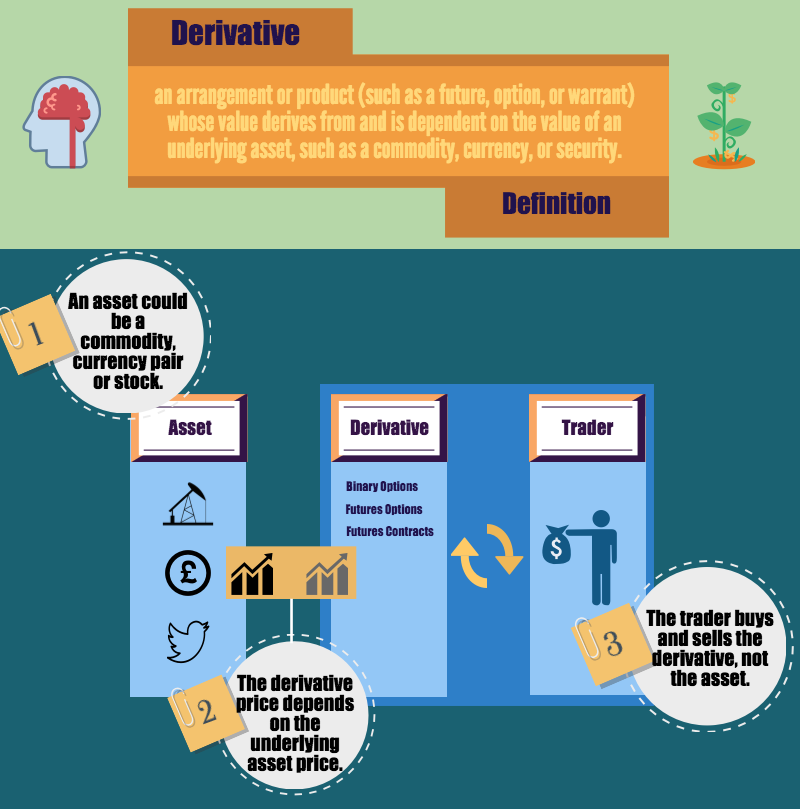A Guide To Derivatives
Are you looking to diversify your trading activities? When looking at new ways to explore the equities, bonds, currencies and commodities markets, you’re likely to see the term “derivative” bandied around. Here, we look at what this means and put a spotlight on some of the more commonly encountered forms of this ‘big tent’ of financial instruments.

Derivatives Definition;
With derivatives, you are almost always taking a bet in one form or other based on your assessment of what is likely to happen or what is at risk of happening in a particular market.
Financial derivatives usually ‘derive’ from – in other words, depend upon the performance of underlying investment – for instance, a stock, commodity price or currency level. But it doesn’t involve the purchase of the asset: rather, a derivative is essentially a contract between two parties which specifies the conditions under which a payment might be made between those two parties. Most commonly, the conditions that determine when and if payments are made include the price of the underlying asset and the date at which the asset hits that price.
So a derivative definition is essentially, a bet on which way an asset or market will go. Depending on the terms of the derivative (i.e. the position you have taken – or, in other words, which way you happened to expect the asset price to go), this means it is possible to make a profit or incur a loss both in situations where the market goes up and goes down.
Derivatives Trading: How Are They Used?
Hedging
Volatility and unexpected movement is par for the course in virtually all markets – leaving companies at the mercy of the elements (quite literally in the case of Agri-business). Take the Ryan Airs and Easy Jets of this world, for instance. To keep ticket prices low and to still turn a profit, near certainty about the cost of overheads is desirable – with fuel being the big one.
So, if you think that oil prices have hit rock bottom at $45 a barrel, now might be the time to enter into an arrangement to purchase your oil for the next quarter at $50 a barrel. Yes, things in China could take a further downturn, triggering further falls in the price of Brent crude (in which case you’ve technically lost on the bet). Equally, an escalation in the Middle East could trigger an upward spike, from which you’re shielded for the time being.
Crucially though, what you have is certainty on price for a defined period. Excellent news for businesses trying to map their future costs.
Speculation
For every party looking to hedge, there has to be someone willing to take on the risk. ‘Speculative trading’ might conjure up memories of Barings Bank, but in reality speculators have an important commercial role to play in all of this.
There are opportunities for retail investors and part-time traders too. With this in mind, here are three examples…
Futures contracts
What are they?
These are contracts that specify that a defined quantity of a certain share, currency or commodity WILL be bought for a specific price on a specific date.
Are they for me?
- Suitable for day trading and longer-term trading
- Platforms are relatively easy to use – although it’s important to get to grips with trading mechanics
- Generally easier to get in and out of compared to stocks
- You must be careful to get out prior to expiration of the contract so you are not left in an open position at that time
Futures options
What are they?
With an option contract, the buyer of the option has the right – but not the obligation to buy (to exercise a “call option”) or to sell (to exercise a “put option”) an asset at a specified price (the “strike price”) on or before a specified date.
Are they for me?
- The absence of an obligation to buy limits your exposure. The maximum you can lose is the price you paid for the option.
- You are paying for the time value of an option. You can therefore sometimes be faced with the discouraging scenario of an asset moving in the direction you want it to – but not fast enough to make up for the fact that the expiry date and time is approaching.
Binary Options
What are they?
A form of options trading whereby as a binary option buyer, you are paid a fixed amount if the strike price is reached come the expiration time – and are not paid if it isn’t.
Are they for me?
- Simple and straightforward and have captured the imagination of UK investors
- Certainty: the maximum profit and loss is known from the outset
- Bet on markets, commodities, currencies, individual stock prices over a long or short timescale (from less than a minute, up to a full year)
- Can be ideal for investors with strong general knowledge and interest in markets and who have an eye for the general direction of a particular market – but who do not wish to be bogged down in predicting the degree of movement
Some platforms are more user-friendly and offer better value than others. Check out our in depth reviews to hunt out the best.
So while the derivative definition is reasonably simple, the applications within derivative markets are complex. Binary options are perhaps one of the simplest examples of derivative trading.


No comments:
Post a Comment